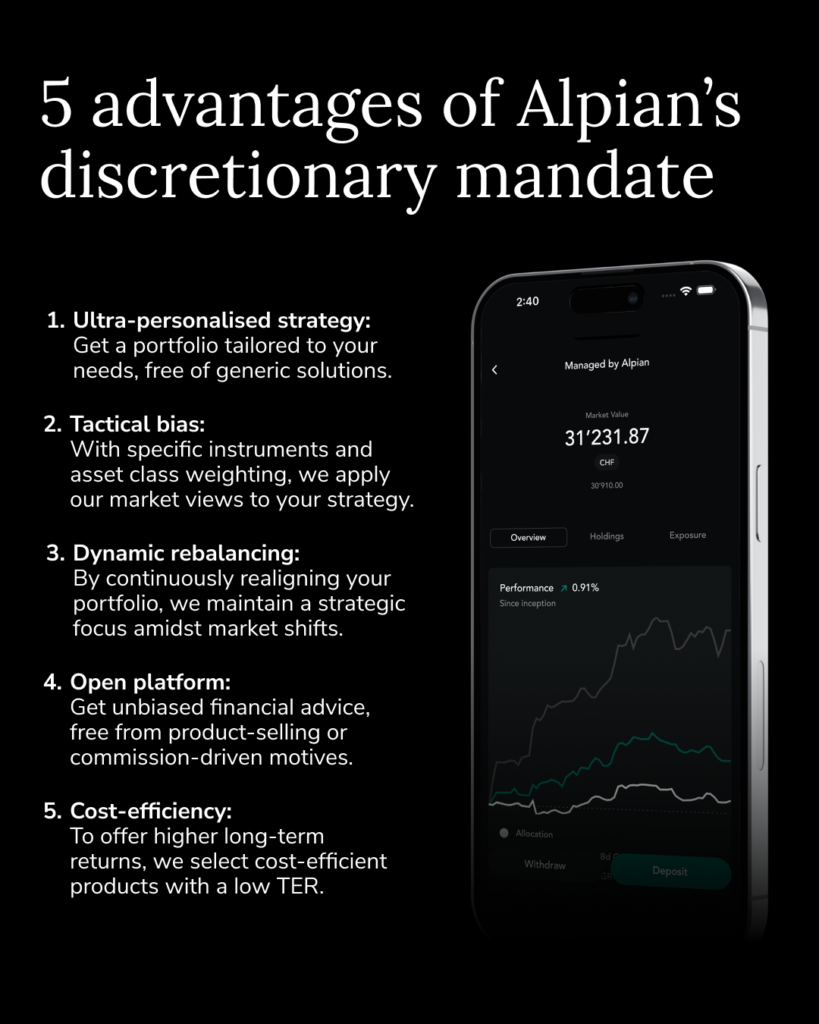The glossary
Discretionary mandate
A discretionary mandate is an investment management service effective for investors who prefer to delegate their investment decisions. Clients collaborate with the bank or financial institution to define their risk tolerance, investment timeframe, and specific goals. The portfolio manager then creates a portfolio aligned with these criteria. Once the mandate is in place, the client’s assets are managed according to the determined investment strategy, with the institution making decisions on buying, selling, and implementing strategy changes without needing the client’s approval for each transaction.
The management of the assets is proactive, adapting to market conditions. Clients receive updates and reports on their portfolio regularly. This approach offers a straightforward way for clients to have their assets managed by experts, while still keeping informed about their investments.
Key elements of a discretionary mandate
- Personalised investment strategy: Tailored to each client’s specific risk profile and financial goals.
- Autonomous decision making: Investment professionals operate with discretion, making decisions without needing client approval for each transaction.
- Entry threshold: Generally requires a minimum investment of several hundred thousand CHF. However, Alpian makes discretionary mandates accessible for everyone with its revolutionary “Managed by Alpian” solution.
- Client-manager partnership: Focuses on aligning investments with the client’s long-term financial objectives.
Benefits of a discretionary mandate
- Customised portfolio management: Unlike standard investments, portfolios are uniquely tailored.
- Expert management: Clients benefit from the expertise of seasoned investment professionals.
- Strategic asset allocation: Investment decisions are well-informed, strategic, and aimed at achieving specific financial outcomes.
Opting for a discretionary mandate means choosing a highly personalised approach to investment management, ideal for individuals seeking tailored strategies aligned with their unique financial aspirations.

Investor corner
A discretionary mandate is a convenient way to have money professionally managed. While it frees the investor from the hassle of everyday investment decisions, discretionary management requires a high level of trust in the investment professional in charge.
While the discretionary mandate provides a convenient and hands-off approach to investment management, it’s important to note that it’s not the only option available for investors seeking professional guidance. Another equally viable and popular choice is the advisory mandate.
Anecdote
Discretionary management does not make any reference to the type of investment product that will be used. What matters is the risk level of the security, which must always remain in the risk profile of the client and suitable for his/her strategy. Although, a small allocation tolerance is the norm.
The edge of the Managed by Alpian discretionary mandate
In a world where financial products often feel like they’re churned out of a cookie cutter, Alpian stands apart with its discretionary mandate. Here’s how we offer you a bespoke approach to growing your wealth:
Ultra-personalised strategy: Your Financial Fingerprint
At Alpian, your financial strategy is as unique as your fingerprint. Unlike traditional banks that put clients into one of maybe ten predefined profiles, we break free from these rigid blocks.
Your portfolio at Alpian is a precise match. It mirrors your individuality, reflecting your distinct risk appetite, time horizon, and financial goals. This level of customisation is usually only available for wealthy individuals.

Tactical bias: Applying market insight to your advantage
Markets are dynamic, and so is our approach. Alpian’s tactical bias means we’re not just passive observers. We actively apply our market insights to your strategy, selecting specific financial instruments and adjusting asset class weightings. This proactive stance allows us to seize opportunities and navigate market ebbs and flows with agility.
Dynamic rebalancing: Keeping your goals in sharp focus
Financial markets can shift in the blink of an eye. But fear not! With Alpian’s dynamic rebalancing, your portfolio stays aligned with your strategic objectives, no matter how the market tides turn. Our continuous portfolio realignment ensures that your investments remain consistent with your goals, providing you with peace of mind.
Open platform: Unbiased advice, your interests at heart
Transparency and honesty form the bedrock of our advisory services. Alpian operates on an open platform, meaning our advice is unbiased, free from the entanglements of product selling or commission-driven motives. Our sole focus? Your financial wellbeing.
Cost-efficiency: Prudent selection for long-term prosperity
In the world of investing, costs matter. At Alpian, cost-efficiency is a cornerstone of our strategy. By selecting products with low Total Expense Ratios (TER), we ensure more of your money works for you, paving the way for higher long-term returns.
There’s more!
Discover the key differences between a discretionary and advisory mandate, and find out which aligns best with your financial goals and decision-making style.